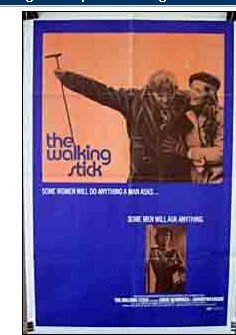
THE WALKING STICK
UK, 1970, 96 minutes, Colour.
David Hemmings, Samantha Eggar, Emlyn Williams, Phyllis Calvert, Ferdy Mayne, Francesca Annis, Dudley Sutton, John Woodvine.
Directed by Eric Till.
The Walking Stick is an enjoyable romance with caper film. Samantha Eggar was a star at this period: The Collector, Doctor Dolittle, The Lady in the Car with Glasses and Gun. David Hemmings had also made his mark with Blow Up. The film has a veteran supporting cast including playwright Emlyn Williams and Phyllis Calvert. Francesca Annis appears in an early role (and was to be Lady Macbeth the next year in Roman Polanski’s Macbeth).
The film is familiar material – but done in an entertaining fashion. Direction is by Eric Till who made comedies like Hot Millions in the 1970s, directed quite a number of television features over the decades and directed the Joseph Fiennes Luther in 2003.
1. A successful romantic thriller, the conventions of the love story of the caper thriller, the blending of both for audience satisfaction and insight?
2. The focus of the title and its presentation during the credits, as a symbol for Deborah, as a symbol for Deborah's aiding of Leigh? The presentation of Deborah trying to proceed in the station, on the train etc.? The use of the walking, stick, the walking stick an an excuse for Deborah hiding. her being released from the walking stick by her association with Leigh the scenes of her needing it later on? An appropriate symbol, intrusive or used appropriately?
3. The effect of such a small scale love thriller in Panavision? The use of colour? London atmosphere of streets. homes, places to be robbed? The background music giving an appropriate atmosphere for the love and the thriller techniques? The importance of close-up profiles? The use of ordinary sounds, the silences? The audience being able to share in the emotions by the sounds and the silences and at times distant tableau especially of Deborah and Leigh together?
4. The initial focus on Deborah as a character, her personality, her withdrawn kind of life? The romantic interest and her cynicism? Her being presented at work, coming home, her encounter and clashes with her parents, her measuring herself by their success and professionalism, comparing herself with her sisters? The importance of the party sequence and the effect on her, the chatter, her knowledge of her York and the superficiality of people around her? The clash with Leigh? The importance of the discussions with her parents and their pressurising her to go out? Her withdrawn attitudes? How well sketched in was the character of Deborah? A credible modern young woman?
5. The presentation of her parents in their professionalism, their skills. their communication with each other. the superficial communication with their children and yet their interest in Deborah? Their separate ways of existence? Their pressurising her to go out? Their wealth? Their background when the shift of the film went to the crime? Their accepting Deborah and Leigh living together, for example their presence at the party?
6. The atmosphere of the initial party and the comparison with the later party when Deborah and Leigh had a house warming? Audiences' initial response to Leigh similar to that of Deborah? His talk, alienating her, his parents? The importance of the collages, effect of his calls and her responses and eventually going out? A simpler technique in her refusal to pose for painting? The offset of their outings, going to the cinema, to the studio? The gradual bond and the effect on Deborah?
7. How well did they communicate, share interests, talk? The question of marriage and living together? The building up of Deborah's hopes? Her life with Leigh the change of attitude at work? The importance of the house warming party? The irony that this was all planned by Leigh?
8. How well did the screen play make the transition from love story to crime thriller? The various suggestions of character? Jack and Eddy and their appearances and sinister suggestions? Leigh and his association with these people? His gradual suggesting these things to Deborah and her final realization of what was involved? The contrast then of Deborah's effect on Leigh and his falling in love with her? The preparation for emotional conflict and loyalties?
9. Audience response to the justice of Leigh’s involving Deborah, blackmailing her emotionally? The presence of Jack and her suspicions of him, his suave attitudes, yet his criminal mentality and ruthlessness? Eddie and his involvement? Deborah's greater involvement and her inability to get herself out? How much was fear, insecurity, love for Leigh? The various other people involved and Deborah's meeting them and becoming associated with criminals?
10. How interesting were the plans and the detailed execution of the robbery? The excitement, dangers, risks, suspense and tension? Plans going wrong, details being corrected, Deborah's involvement?
11. The important consequence and Deborah's learning of the truth about Leigh and his attitude? His attempts to defend himself and his inability to? Her dilemma about truth and justice? Did she make the right decision, the effect on her?
12. The overall effect of this experience on Deborah and her future? Audiences feeling this as the film ended? The screenplay’s technique of making the audience identify with Deborah in all the aspects? A way of insight via the techniques of a romantic thriller?